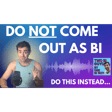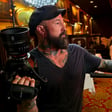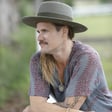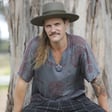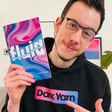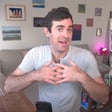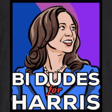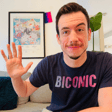Introduction: Bisexual Visibility Month
00:00:13
Speaker
everybody! Welcome back to Too Bye, guys! Hope the end of September is treating you well as we wind down Bisexual Visibility Month, or Bisexual Awareness Month, or Celebrate Bisexuality Month. Whatever we call it, we have three names for it, maybe more. That's kind of like bisexuality itself, it's a very bye thing.
00:00:34
Speaker
Nobody really knows what date it is. There's a bye day, there's a bye week, there's a bye month. But however you've been celebrating, I hope it's been good. I hope you've been able to be visible if possible, and if not, I hope you're able to someday. And good luck on the journey. Happy bye month.
Interview Conclusion: Louis Oakley's Insights
00:00:50
Speaker
Today, on to Buy Guys, Buy One, Buy Guy, we have coming up the conclusion of my interview with Buy Activist in the UK, Louis Oakley. We got into some really interesting stuff in this second half of the chat. Louis has been doing this a long time, longer than I have, and he has some really unique insights I thought were cool both last week and in this episode.
00:01:11
Speaker
And then, since I split his interview up and it's a little short, I'm going to give you another little bonus. This is already on the internet, so you can find it. Maybe you already saw it, but just in case you didn't, I'm going to put it in this feed for you to enjoy easily without having to do anything. Just keep listening.
00:01:29
Speaker
I did an Instagram Live with Lucy LaForge, who is a musician and the creator of Lucy and LaMare. You can find them on Instagram at LucyandLaMare. She hosted me for Buy a Visibility Week on her Instagram. We did about a half hour chat. And maybe you already saw it, but just in case you didn't, I'm putting it in this feed.
Bonus Segment: Instagram Live with Lucy LaForge
00:01:48
Speaker
You're probably maybe sick of me interviewing other people, although I do tend to talk quite a bit, but here is a chance to hear someone else interview me. I told my more of my story toward the beginning of this podcast, Season 1 and 2, and so it's always nice to kind of revisit these intro questions and how did I come out and stuff. and it's It's always evolving for me, like how I tell the story and what things I focus on and where the conversation goes. So stay tuned
Complexity of Bisexual Relationships
00:02:20
Speaker
for that. But now here is the conclusion of my chat with Louis Oakley. Enjoy.
00:02:32
Speaker
Let's talk a little more about relationships. That was sort of the chapter in the book that I was like really fascinated by every answer. But another thing that comes up a lot and it's related, you mentioned sort of when you come out, often you got to have an answer of do you want to open the relationship or not? But the thing behind that that so many people get that they want to know about is, like how do I reassure my partner that they're enough for me? And and on the other side, like how can I be enough for a bisexual partner? And then like another question you ask that people don't always get to is, what if my partner isn't enough after all? like What if I reassure them when I come out that they're enough? And then later, it actually turns out
00:03:18
Speaker
I do want more. How do you, how do you answer those or how do you recommend people navigate that? Well, they're always really hard. but And it's kind of what you've been saying, this whole thing is like people aren't always consistent. So, you know, you don't know how you're going to feel in five years time. You don't know how the relationship is going to go in five years time. So, but the relationships and love, like it's all a risk. Like you can't go in with, um,
00:03:44
Speaker
sort of a, ah you know, a ah game plan or real reassurances. And I think one of the things I say in the book is like, this idea of like, well, I won't date a bisexual guy,
Misconceptions and Fluidity of Bisexuality
00:03:54
Speaker
so then I'm protected from all this. It's like straight guys cheat. that's right right The straight guys end relationships, like you're no better or worse off, like that there are still going to be risks in in life. um And straight guys can realize they're bi later also. I did. I was straight. Straight guys are fluid too, even if they don't acknowledge it at the time. Yeah. Well, this is the thing. I think the people sort of think, well, if I don't take bi guys, then i like ah my chances are better off. It's like, that's just not good science. um So I think that that's always a ah tricky one and to kind of get across to people.
00:04:32
Speaker
um like you lost my trail of thought there. What was the question? Well, well i'll well ah I agree. You kind of said like you something you wrote in your book is you can't go into sexuality with a game plan. It's like you don't really know, especially with this kind of fluidity, what the future will hold. And so I think I agree with you. It's like you said sort of if you're coming out to a partner, you kind of have to have some answers for them, which I agree with.
00:05:00
Speaker
But you can't necessarily have answers about what it will be like in five years. You kind of have to have answers about how you feel now and what you want now and be as open and honest as you can about like what's going on. But I feel like with this sexuality comes sort of an acknowledgement that things are fluid and things can change. And the most honest thing you can kind of say to someone is, this is what I want now, and this is how I feel, and I love you. But like, you know, and I don't, or like I do or don't want non-monogamy. But to be honest, I don't know how I'll feel in five years, because five years ago, I was straight, you know, or I thought I was. So that's what she might not know. She's not gonna know how she's gonna feel in five years.
00:05:44
Speaker
Right. even Even when people want that stability and they want the concrete answer, who who knows anything? You have to take the risk for love. yeah Yeah, I liked that line in your book, you can't go into sexuality with a game plan. It rings very true. um Another question in there that I'm curious to hear you answer is like,
00:06:08
Speaker
i The question is, I'm worried my partner knows I watch porn. How can I approach the subject? Where did that question come from? And like, what are your thoughts on that? That came from a real life um situation encounter. So I, I can't remember how I met this guy, but he was bisexual, but he lived in London. um And I was like, well, we can go for a drink. We actually don't work too far from each other. Let's go for a drink.
00:06:36
Speaker
And so we were talking about things, and then like he sort of opened up. like He was going to tell me something really dark, and like the way he looked at me. And he was like, the thing is, like I do watch a lot of gay porn, and I'm just really worried that like like what everyone says is true. like One person isn't enough for me, and like I'm always going to be like needing to watch his gay porn.
00:06:59
Speaker
And I just like looked at him and what I said was not profound at all. I was like, yeah I wouldn't really worry about it that much. Cause you know, loads of straight guys watch porn every day and no one worries that like, Oh, the partners aren't enough for them or that they're going to have to leave because they're dating a blonde and they've been watching porn with a red head.
00:07:16
Speaker
They're gonna have to go participate in like a gang bang. Yeah, cocky orgy just because that's what they watch. Yeah, exactly. And literally, I'm not kidding you I saw from this guy's like face and like looking like he was going to tell me something really dark and awful.
00:07:31
Speaker
I literally saw it just lift off his face, like the stress of it all. No, it wasn't because I said anything clever. I think it was because another bisexual guy who he hadn't been able to speak to any other bisexual guys in real life said to him, I don't think that's anything to worry about.
00:07:48
Speaker
And no one in his life had A, ever said that, or B, had the authority to say that
Community and Stigma Around Porn
00:07:54
Speaker
in so much as, I'm going through the same thing as you, and I just really wouldn't worry about that one. um And I think that that's what we sometimes need from like the lack of what can sometimes feel like a bisexual community for for a lot of bi people, like not being able to have other bi people around to be like, you know what? I wouldn't worry about that one. That one's fine. And and I think that that's what that's what's important.
00:08:17
Speaker
I totally agree. Part of why I pulled that question out was because to me when I read it, I was like, oh, is that a problem? like My partner might find out I watch porn. like oh like My partner watches me watch porn sometimes. and i I've literally watched her watch. you know like That's yeah very normal for us. than we talked But like ah it I forget sometimes that there's so much stigma, especially when you're not yet part of the community. If you're in the straight world, like there's stigma around all this stuff and around porn. And even though even though so every straight person probably watches porn, like they don't talk about it. They don't share it with their partners. It's this like secretive thing. And so
00:09:03
Speaker
that throwing that question in there reminded me that, you know, i I was in that world for some time, too. And I was watching gay porn and not telling anyone and thinking it was the most shameful thing I could do. I'll never tell. Yeah. But I think if you're bisexual and one of the main things that's aimed at you is one person will never be enough for you. And then you're exhibiting behaviors that you are then like feeling like, oh, this is what they meant. This is what they meant. And this is wrong. And it makes you feel bad about yourself.
00:09:32
Speaker
Right. Yeah, exactly. Yeah, totally. Okay, another question that I find fascinating and I would like I've often struggled to find answers for and still don't know is um the question in the book is, I want kids, should I be with someone of the opposite sex?
Partner Choices and Parenthood for Bisexuals
00:09:50
Speaker
And also later, there was another question, I want to have a biological child, is it wrong to choose to be with a man or a woman simply because of that? So like what are your thoughts on that? I think this is something we don't talk enough about because
00:10:05
Speaker
your choice of a partner in terms of ah your bisexual identity, like there's so many options, but there are just practical considerations. And with some of those choices, you can't have biological children and with some you can. So how do you factor that into your choosing a partner?
00:10:25
Speaker
It goes back to something that you pulled up out of the book, which is you cannot go into your sexuality with a game plan. So I think the example I use in the book is like, if you are in a same sex relationship and then suddenly one day an alarm goes off on your phone that you said like, oh my God, I'm so sorry. I told myself that I would be with someone of the opposite sex so that we could have a child. So we're gonna have to end this really great relationship and you're gonna have to move out because that was what I decided. Like that conversation does not happen.
00:10:54
Speaker
People go out and date. They find people they like. When you're bisexual, they might be of different genders. And then you navigate it from there, where it's like, oh, we've been together like four years now and I did always want to have kids. And obviously that can't happen because we've both got two penises. We've both got a penis. So what could we do about that? We both have two penises would be a fascinating relationship. That sounds kind of fun, actually.
00:11:20
Speaker
That would be interesting. um So then you can look at adoption, you can look at surrogacy, you can look at different options there. But I fundamentally don't think that you um can go into your sexuality of a game plan where you can kind of a you know aim for the gender you want. It's kind of like the same as like you know your mom saying you've got to marry a doctor. Well, what if all the doctors I meet are not nice and I don't click with them and the sex is bad?
00:11:44
Speaker
You know what I mean? So it just doesn't really work that way. And similarly, you know, I would say if you're going to bring a child into this world, speaking from experience of having three children, you really need to do it with the right person because it will kick your ass and you want to make sure that you and your partner are strong and ready. And even if you had to go through a really hard gig to get those kids, actually ah you know, you just want to make sure you were the right person and the gender shouldn't come into that.
00:12:11
Speaker
Right, that makes a lot of sense to me that like the compatibility of partners matters so much more than this one thing, one trait. I mean, I have no idea that it would be this hard, you know, especially because we've got two that are very young, like trying to do everything sleep deprived, always having a child there like, you know, even write it. One of the reasons I do so many podcasts and TV appearances now is because once it's done, it's done.
00:12:40
Speaker
I have been asked to write things and honestly the other day it was almost like a comedy trying to write something where like I went into the bedroom to do it quietly and then my son came in who's two and he jumped to my back he was like hello daddy hello daddy hello daddy like jumping from side to side I was like oh my god this isn't gonna work So then I went to do it in the living room whilst I put like TV on for them. And my daughter came and just kept closing the laptop, closing the laptop, closing the laptop. Then I went back to the bedroom and then my daughter was just jumping on the bed so I couldn't even type. And then she tried to type and delete what I'd written. It was like, oh my God. it's It's one of those things where, you know, you can be driven to madness by children. You need to be in it with someone that you've got a really solid relationship with. You can't just be aiming for a set of genitalia.
00:13:23
Speaker
Yeah, I think that makes so much sense. like That's so much more important. buy it And I think four or five years into a relationship, no one is having that conversation like, oh, I wanted biological children, and we can't have them. Therefore, we should end things. But I do think people, especially Well, I do think people cut things off before they even begin because of that. like i I agree you can't go in with a game plan, but I think a lot of people do, and they especially when it comes to biological children. It's like a thing that's ingrained in a lot of people because of culture or their religion or whatever.
00:13:58
Speaker
And like they will I think that's also why there's many straight identified people who are a Kinsey one or two who cut off bisexuality as even a thing they might identify with because of the biological kids thing. Because they just they want that. That's their game plan. And they cut out any potential matches that they can't have biological kids with, even a you know cisgender heterosexual relationship, if kids are not possible, that can break up a partnership too, and they'll move on. And so like that it just is so common. Oh, no, it happens. I don't i didn't think it should, but it happens, and people definitely you do that. And like you say, street people do that as well. So it is um
00:14:44
Speaker
It's definitely something that goes on, but I just, I hope from reading the book, people will understand. a little bit more about it and maybe get a bit more perspective on it so that they don't cut off relationships that could work otherwise.
Navigating Relationships Without Expectations
00:14:59
Speaker
Right, I agree with you. like You shouldn't cut it off for that reason and you you can figure things out as as you go and and like there will be ah an answer or an option that will work even if you think you have this game plan. But but it's very hard to break out and follow that advice when like it just feels like so much of the culture is
00:15:20
Speaker
is following that game plan but I completely agree with you.
Enhancing the LGBT Community for Bi People
00:15:33
Speaker
OK, just a couple more questions. Let's do some some rapid fire, because there were a few more that I thought were interesting. I didn't really do rapid fire. Well, yeah, OK. You know, so as much as we can. ah That's fine. um ah You mentioned the bi community. I mean, that's a big part of your advocacy. We don't have to get too deep into it. But obviously, listeners of this show know that the bi community receives far fewer resources than the rest of the LGBT community.
00:16:03
Speaker
um and like we're much less visible. So you one of the questions in your book, how do we improve the LGBT community for bi people? And then I also want to throw one at you. like If we did get funding, the funding we're asking for that's dedicated for the bi community, what what should we do with it? What do you think we could do?
00:16:27
Speaker
so much so the first thing I would really like to see is um a lot of money invested into research because as someone that writes a lot of articles that I have statistics and some of the times I'm i'm talking about statistics from 2012 because that was the last time they asked bisexual men are you out of the closet or whatever it is yeah I think having regular statistics would allow us to know what bi people are dealing with and if it's improving and I think that someone taking responsibility for that and saying, look, every year or every two years, we will produce an annual report where we'll speak to 5,000 bisexual people and really get under the skin of what is going on. Then people like me have something to aim for. It's okay. This is what we need to be talking about. Because at the moment, it feels like, my God, it's everything. It's from relationships to employment to coming out of the closet to mental health. There's so many problems. Where do we even begin?
00:17:15
Speaker
um So I think that that would be quite important. I also think that a lot of money could be invested into seeing how we could build bisexual communities. Now, I don't think that we should always look at the gay community and sort of be like, oh, we need to be like them. I think it needs to be a little bit different. you know like Even in the UK, we have bi pride now, and it's just not the same as, you know, and the other prides. And I think part of that is maybe, you know, we need to lean into bisexual culture. So one of the things I always talk about is, you know, a lot of bisexual people, not all of them, obviously, but a lot of them seem to really love sci-fi. So would they be just smarter for us to take over the comic cons?
00:17:54
Speaker
like to have a presence at comic cons and really take that over and make it a fancy dress thing and make it like we get to geek out whilst we're talking about bisexuality. So actually being smart with stuff like that. um I think that we do need to put some money into media representation as well. So it'd be really great. Like one of the things we talked about doing on Bisexual Brunch was coming up with a list of characters and a list of storylines that were bisexual and just sending them out to production companies and being like, rather than remaking this film that you made in the 80s,
00:18:23
Speaker
why not take a chance on a news story like here are some really interesting situations that would only ever happen to a bisexual person and some interesting bi characters like it's for free use it um because i do think with media like i always go back to that sex and city example like i think if they'd have done bisexual men in the right way i think that would have changed a lot of women's mind but the fact that they just went into the old tropes that didn't work out like that just cemented it in a lot of women's minds like nah nah um So I think that that is is really important, the media representation size. And then I just saw Miranda's bisexual now. So on the new version, she said the word bisexual. I still haven't heard that word. I don't have anyone's mail. I don't watch at all, maybe. i don um't remember Yeah. and think so But and then it is different for the bisexual men. I don't know how they're dealing with that. I'm not. Anyway.
00:19:13
Speaker
I think the old sex in the city that
Challenges in Bisexual Relationships
00:19:17
Speaker
that by that negative bystander that was formative for many people I think yeah I just, I don't really, I've written an article about, um, and just like that, because I just don't understand how they've got, I can't, I don't understand how Carrie has a best friend that's non-binary, but she couldn't get her head around bisexuality. Like I need to see your transition. And yeah my, like, my idea for the next series of and just like that, which they'll never go for is I really want the premise of the series to be that Carrie gets canceled.
00:19:47
Speaker
because all of her old articles resurface, and people are like, I can't believe you said this. And then we can watch her over a see a season, sort of deal with her past ah opinions and and learn, and then we can grow with her. That's a great idea. I love it. Yeah, well. That's a good idea.
00:20:03
Speaker
which you just want to call me. um yeah so ah So that's that. And then I just think as well, just some of the issues that are bisexual specific. So I think a lot of a lot of the time that bisexuals get a luck in is only because it also relates to gay men. you know One of the issues that I've been talking about a lot recently is bisexual people staying in relationships too long.
00:20:22
Speaker
And I think that bisexuals have anxiety about leaving relationships. So oftentimes it's not just that you're leaving the relationship and that's person, you're leaving that culture. So you might lose your community, your connection with the LGBT community because you're no longer dating a gay guy, you're no longer getting invited to gay events and whatever. All the same with the straight community. Like you were just saying like, oh my God, now I could have had biological kids with that person, but now I might not have biological kids. And I kind of got my head into that was going to be my life. And that was a cult tourism.
00:20:51
Speaker
yeah And I think that's really hard. And if you look at the statistics for how many bisexual people are um you know in domestic violence situations and getting abuse from their partners, it's a lot higher than it is for any of the other um LGBT subgroups and even higher than straight people. And I think that you know issues like that need properly looking at and proper ideas on solutions.
00:21:17
Speaker
Yeah, yep, indeed. on ah On a very different note. Another question in your book is, why is there never any good bisexual merch? Yeah. ah Well, I'm curious for your perspective, because I feel like I have a ton of bisexual merch.
00:21:36
Speaker
But i is it any good? I don't know. It's all the same buy flag on a pin, buy a flag on a shirt. What do you mean by that question? And why why do you think there isn't any?
00:21:46
Speaker
so um I mean, maybe there's a difference in the UK, but whenever, you know, in previous years when I would go to Pride and it was like, you would go into some of the shops and be like, you could get a Pride t-shirt, you could get a gay and proud t-shirt or whatever, there were not many specific bisexual options. I think it has changed recently in the last few years, but at the same time- The last year or two, I've seen it more, but- Literally the last two years, but before that, it was very hard to come by anything other than the by Pride flag.
00:22:17
Speaker
But then I think then you think, okay, so now oh you can shut up Moaning Lewis, because now they've got a bisexual t shirt. But actually, like, there's not a lot of variation. So unless you're into loud colours, which I'm not, like, there's just not a lot of things to wear. Like, I want to be sort of subtle with it. So I actually ended up for a a photo shoot I did before, actually designed a logo that just said bisexual.
00:22:39
Speaker
and had it printed on a t-shirt and then I got a load of different colors made and people loved it and people were like where can I get this because it was just it was more my style right it was a black t-shirt with white writing that said bisexual with like a logo on it um and I think that that's what I'm talking about it's like you know yes there's a bisexual t-shirt but and it might not be everyone's kind of style or cup of tea and I feel like Especially when bisexuals, the thing we struggle with is visibility
Economic Influence and Representation
00:23:05
Speaker
the most. you know A gay person only needs to hold their partner's hand to be seen as gay, and it's like, oh, that's a gay couple. And a straight person obviously has a whole of society to be like, yeah, we we're seen. by Everyone thinks everyone's straight.
00:23:17
Speaker
yeah a bisexual unless we're literally having like a mixed gendered orgy in the street like no one sees that so and they can't do that anymore so yeah why i mean that's how i like to advertise my bisexuality i don't know about you So for me it was I had to make a lot of merchandise myself of like different like things that I wanted to wear to prides or different events that just had bisexual and that were more my style and so I did and I do think on a serious note the more that bisexuals buy things like my book um the more that you know publishers and retailers see oh actually you know what's really weird there's technically more bisexuals in the world than there are gay and lesbians combined and actually if we start selling things to them they buy it
00:24:01
Speaker
And then I think as soon as we become valuable to the economy, it's game over because then I think people caught on and then people yeah okay we need to care to these people because they've got money. Yeah. Well, we may be at the beginning of that wave because just as you said, in the past year or two, I've seen ah a bit more and among like Gen Z, it's like 20% are queer and most of them are bi. And I would guess that the next generation, those numbers will go up even more. And if there's any money left in the economy by the time those kids have jobs, then they will probably be wanting to buy more bisexual stuff.
00:24:40
Speaker
And then capitalism will validate bisexuality, finally. then That's the true validation of it. yeah That's when we know we really exist when we become part of the capitalist machine.
00:25:01
Speaker
Let's see, we kind of answered this one maybe the last question or two. I mean, you sort of touched on this, but it's in your book. And actually, either Piers or Lawrence, one of those guys who interviewed you asked you this, and I actually was like, oh, that's a legit good question. Even though he kind of asked it as a gotcha question, but it actually is a good question. It's like, oh in your book, you wrote, it's terrifying to not know the gender of the person I'm going to end up with. How do I deal with the uncertainty? I mean, we kind of talked about uncertainty in general. I feel like that happens for bi, fluid, poly people.
00:25:36
Speaker
in multiple different ways. There's uncertainty and in your life trajectory. How do you deal with that? I think you just have to sort of embrace that this is your path. Like, this is what being bisexual is, this is part of the gig. And whilst, yeah, that uncertainty can cause anxiety, actually, you need to focus on the positives of, my God, I'm not bound by gender here. Like, I can end up in so many different situations and there's so many different people that that are open up to me. um
00:26:10
Speaker
and really lean into sort of the positive aspects of that and not worry too much about the end game or where you're going to end up. like Obviously, you know people are going to have different things that they want. Maybe it is kids, maybe it is marriage or whatever it is.
00:26:24
Speaker
And have those things definitely in the back of your mind. lab That's what I would like to go in. But right now I'm dealing with what's in front of me and I'm enjoying that, you know, I have this brilliant gift that means I get to find most of the population like, ah you know, attractive, even if you don't find everyone attractive, it's still like, you know, I can find different people attractive and I can be in lots of different situations, which is really quite nice.
00:26:44
Speaker
Yeah, I love that. It's easier said than done, but it makes perfect sense. Last question, maybe related, maybe not.
Empowerment Through Visibility
00:26:51
Speaker
ah What brings you joy about your sexuality? What brings me joy? um
00:27:00
Speaker
I mean, i I like looking at hot men and hot women, so that's nice. Like, you know what I mean? Like, being here, being like, oh, he's hot because of this, and she's hot because of that. Like, that that is nice, and it's, you know,
00:27:12
Speaker
I get the same amount of joy someone else does from their sexuality. I think for me personally, ah just sort of being able to have a bit of an impact in this space. And, you know, for me, the way I got into this was because people were being mean to me about my sexuality. And then I realized I could defend myself. And then I thought maybe I could defend other people. um And that's how it all started. So being able to feel like I can be the person that I didn't have, um that if you Google bisexuality, it's not just, what is bisexuality? Because it's bisexual visibility day and but and that's your one article a year. It's like, oh, actually there's a piece here about something really specific. And that's kind of what I have hoped to have done in the book is like to not make bisexual people feel alone, which I think a lot of them do, to actually say, look, there are loads of bisexuals in the world and actually,
00:28:04
Speaker
what you're dealing with and the questions that you have, you're not the first person to have ever run into these. That's the whole point of the book is like, look, here are some of the most common things that might happen to you. And here are some of the solutions. And what I'm hoping for one day is that some like, someone reads this book and thinks that's never happened to me. I've never like worried about, you know, watching gay porn. And then it happens to them or whatever it is. Oh, my God, I read that book. And actually, this is totally normal. Or actually,
00:28:30
Speaker
I know how to deal with this. And that's what I kind of want to give people is like, look, I've done the work. Like here is here is everything that I can possibly think of that could happen to you or that you could be asked. And here are some ideas for how to deal with it.
00:28:45
Speaker
Yeah, cool. I love that. And it's so it's actually very similar to what I enjoy about doing this kind of work, which is like, before I came out, I i didn't want to have to explain myself. I didn't want to have to prove things to people. And that was what kind of kept me closeted, I think, for some amount of time. And then once I started realizing I had to come out, I would explain things to people.
00:29:08
Speaker
and because I kind of had to at that point. And I found that they most of them, especially like people I was close to, were open to hearing about it and learn something. And when it came from me and they didn't expect it, they they opened up to a new way of thinking. And I loved that. Even though it was the thing I was scared of, I actually now love explaining things to people. And it gave me this confidence and this realization that like you know I don't have to be defensive, i can but but actually this makes sense and other people should have to defend their binary views of the world and often they can't. And so I like doing this explaining now. It's such a weird thing, isn't it? I mean, it's such human nature as like the thing that gives you anxiety the most is actually sometimes where you can find the most purpose and discover things about yourself that you didn't know and evolve.
00:29:59
Speaker
And I think that that's something that I try and get across to to buy people that aren't worried about coming out and stuff. Like as much as I don't want to force anyone out of the closet before they're ready is like sometimes leaning into this, leaning into what scares you and making a success out of it is really how you evolve and grow. And maybe sometimes, you know, if you're a believer in things happen for a reason, it's like maybe you were given this because it's going to take you to the next level. Like if it went for my sexuality, I wouldn't be going on TV and doing articles and writing books. So yeah, that thing that once scared me that I was being really secretive about and not even telling my gay friends that I'd just gone home with that guy, um you know, now look at me. um And so I think that that is what I would hope that people that are nervous and listening to this can take away from it. is Just imagine what you can be when you own this. You know what I mean?
00:30:46
Speaker
I love it. Perfect note to end on. Follow Lewis's example of hiding his gay hookups to having bi orgies in the middle of the street. That's the path, the trajectory we all want to be in. Just kidding. Yeah, beautiful. I totally agree. And that's where we'll leave it today.
Instagram Live: Lucy LaForge on Bisexual Visibility
00:31:06
Speaker
Thank you so much for being here. I'm glad we finally got the chance for this crossover. We'll have to do a full crossover and have your co-hosts on here. Yes, we can have you advise such a bunch.
00:31:16
Speaker
I have to come over there at some point. But yeah, it's been really great to finally have this chat. Thanks for ah being on Two Bye Guys. Thank you so much for having me. I've loved it.
00:31:34
Speaker
That was my chat with Louis Oakley. Hope you enjoyed. Now here is my Instagram Live with Lucy LaForge of Lucy and LaMare. Enjoy.
00:31:52
Speaker
to buy guys which is a brilliant by podcast and they're gonna be with us in just a moment but I really wanted to have this conversation for by visibility week because I think it's so important to talk about by men and as a lot of you know there are a lot of closeted by men and there's this really lovely podcast, um, that I've been following for quite a while and I'm going to do a little interview, just get to know the host and, um, invite them to chat and share, share their journey with us. So I, Oh no, I'm visible. Yes. Okay. I'm going to add them in just a moment.
00:32:36
Speaker
And please, if you have questions, put them in the comments. um I'd love to hear from you.
00:32:48
Speaker
Hi, everyone. Happy Buy Visibility Week. I put up this cute little backdrop for y'all. Hi. Hello. Hi. So nice to finally me chat with you. You too. Good to be here. How are you?
00:33:05
Speaker
I'm doing good. It's a beautiful day. um Yeah. Indeed. Happy bye week. Yeah, you too. Happy bye visibility week. People can see us again. Yay. We've got another week before we vanish into this. Yes, and we can be so all secretive again. But for for one week, people get to look at us.
00:33:31
Speaker
ah Well, thank you so much for coming on. I've been wanting to chat with you for a while and I'm a big fan of your podcast and good everything you've been doing. And I know you're also in LA, you're a standup comic, you're an author. So you you've got a lot going on and you're such a champion for the bi community and especially bi men. um I just wanted to acknowledge you for that and say thank you for all you've done for our community. and It's really incredible.
00:33:57
Speaker
Thank you so much. It's lovely to be acknowledged and to be
Rob on Humor, Biphobia, and Community
00:34:00
Speaker
visible. And yeah, that the the podcast has been going for like 5 years, but the stand up I just kind of started doing this year and it's been such a fun like counterpoint to the podcast where it's like.
00:34:13
Speaker
you get you can talk about the same stuff but in a different way and kind of diffuse some of the tension of this identity in ah in a really fun way and it's been empowering and like ah yeah I've been enjoying it yeah thank you. That's great yeah and you you're hilarious so I was watching some of the little like clips you have ah and yeah especially the ones about being bi are wonderful. I think that's such a tool too you know to use humor to allow people to get a little more comfortable with the idea of being bi. Yeah, well it's like for so many years I was like, you know, the big fear for bi men especially is like people will think we're gay and we're afraid if we come out as bi then everyone assumes that that's not real and we're actually gay. And I spend so much time in my life struggling with that and then helping other people come to terms with that.
00:35:10
Speaker
And now I open every set I do with this joke that's really short and it's like, hi, I'm Rob, I'm bisexual, or as my wife calls it, gay. And it's just like in that. Oh my gosh. And they laugh and you know it's And it shows that I'm comfortable with that. idea Like it diffuses, it makes it kind of ridiculous that I would actually be gay when I'm identifying as bi. And also it diffuses the tension and it like makes fun of people who think that. And and you know, it's like my wife is thinking that, so how could I be gay if I'm married to a woman?
00:35:49
Speaker
and and in And it's so short you don't even have to, I'm explaining it now, but you don't even have to explain it. It diffuses that whole problem in one sentence and I love i love it. That's incredible. I wonder, so like being so out and being so visible in your life, do you still feel that you encounter any internalized biphobia or internalized shame at this point. um That's a question I get a lot. And my answer is like, yeah, all the time. um I just have to remind myself. and Right. Oh, that's interesting. you did Yeah, I think it still comes. But right, I like i catch myself really quickly. And like I think especially with bisexuality, I've sort of come a long way. and
00:36:40
Speaker
and know that's just like the internalized homophobia that I had for many years, I feel like that's pretty much gone. Like, I think it's cool to do gay stuff. Like, I don't have a problem with that. But I will say, like, there's always some new layer or there's always some new element. Or, like, for me right now, it's exploring polyamory and, like, questions around relationships and marriage and kids.
00:37:08
Speaker
And like as I rethink the norms in those areas, I do find myself sometimes doubting myself or being ashamed of the direction I'm going. and So it's not like directly related to bisexuality, but it's peripherally related. like There's always just new things I'm exploring about sexuality and gender and relationships that, yeah, sometimes when you're at the beginning stages, it's there's some still some stigma and still some shame, but yeah. What do you i and what do you find helps helps you most in those moments?
00:37:45
Speaker
I think a huge thing is like finding other people who are in a similar boat. Like like there's a poly group I go to which has been like the bi group I started going to five or six years ago. This poly group has really helped normalize these things and because because when you're Different than most people you encounter in a day. It's really difficult. And then even if you just spend an hour or two hours with a group of people who get it. That can carry you over for a long time like that can be like, oh,
00:38:22
Speaker
Okay, I'm not crazy. There are other people who think this way, and it's a helpful reminder. um And then the other thing like you know the more I just talk about it with people with people in my life, with my partners on the podcast, like even that's helpful for me. it's like i don't I do go to therapy, but I don't need therapy anymore because I host a podcast. It's basically my weekly therapy discussion. and another And honestly, another thing is I've started coaching by men. um And coaching other people has been helpful for me too, because it's like when I'm helping someone overcome their shame, it makes me rethink mine too. Yeah.
00:39:08
Speaker
Absolutely. I completely relate to that. When I started, you know, talking you about it more and writing songs about it, then all of a sudden people were coming up and being like, oh, it's so great that you're so confident, and so proud to be by. And I was like, I am. I am. Right. Yeah, validates. Yeah.
00:39:28
Speaker
Yeah and using it for your work and like using it sort of in a in a positive empowering way as opposed to just being like fighting back and being defensive. That's a that's a shift so like that makes sense to me that if you're if you're using it as in your work then that's like gonna be empowering. yeah Yeah. Yeah. And it was kind of scary at first. Cause you think like, Oh, I, do I want this to be a part of my day today? Do I want my sexuality really? Cause it is either way, whether you're talking about it or not, it is. right But when you really embrace them, say, no, like people need this. There's a lot of advocacy that is.
00:40:06
Speaker
not there right now that's been trying to be there for a long time. Right, well and actually that's like um my next episode that comes out next week with a bi activist named Lewis Oakley, he wrote part of his book about like okay at first it's like how if you come out as bi how do you get people to not see you as really gay but then the next stage is like okay now that you're at is by how do you get people to see you as something more than just by like especially when you're if you're like making it a big part of your identity or your work like you and I then it's like okay there's more to us though than just the by person or the by musician like so how do you get to that next stage and it is just like
00:40:54
Speaker
You have to be visible as bi, but also then focus on other things you love and and make work about other things and the bi stuff will like be in it inherently, but but to not we don't always have to make it the main focus. Yeah, I i totally hear that because to get people to see you, you very, you have to spell it out. You have to be, hello, I'm a bisexual. And then and it's like, oh, you're making it your whole thing. And it's like, well, no, i I was just very clear about that's all I just, you know, I made it clear. I'm not obsessed with it. Right. But it's hard. It's that binary, right? So people, you're completely one thing and you can't be anything else. Right.
00:41:37
Speaker
right and it's like and people will see just see the latest thing you did it's like oh if it's not about bisexuality are you not are you not doing this anymore are you not but but but i think it is good if we if we all become actual well-rounded humans yeah i agree um so i'd love to like talk about your story a little bit and then we'll answer some of these questions in the comments Um, but if you're willing to share like your coming out, um, story and anything I ask you, you'd be like, no, I don't want to share that. And that's totally welcome by the way. So feel free to let me know.
Rob's Journey: Visibility and Professional Identity
00:42:15
Speaker
But yeah, if you could just share some of your story, what inspired you to start the podcast and a little bit about your journey, some of the ups and downs of being so visible in the community.
00:42:27
Speaker
I always give that caveat to my guests also, but I'm comfortable talking about anything. But we can edit we can edit stuff out, right? We can edit this later before it goes out to people. Sure. Whatever you want. Whatever you want. It is live. but so hope We're live. Hi, everyone. Yeah, okay. So my story. I'm 39 now. It was basically almost exactly 10 years ago that I was like,
00:42:54
Speaker
oh my god i'm gonna be 30 and i and i've had these feelings like i haven't explored them uh and so i started exploring my sexuality in my late 20s like pretty much age 29 i would say up until eight my mid 20s i didn't really question my straightness like i liked women i was dating women that felt real and valid and and i looked at it as very binary so i just didn't think I was gay because I was into women but I will say at some point in maybe caught like early 20s I started to like become aware that I thought some guys were hot. I just thought that's all straight guys think that like you straight guys can recognize that and it doesn't mean I'm gonna want to do anything about it. It's just like
00:43:47
Speaker
everyone knows that some guys are hot, right? But then in my later 20s, I would started watching some gay porn. And I was like, also justifying that as something straight people do, which is not necessarily. Maybe, sure, every it's all a spectrum, but not necessarily.
00:44:08
Speaker
And then finally, by my late 20s, those thoughts had been coming up enough that I was like, you know what, maybe this is something I need to explore to figure it out. So I explored it in my late 20s. There was about a year or so of exploration where I wasn't talking about it with anyone other than the guys I was exploring with. And then around age 31, I came out but i like to my friends and family first, and then within six months of like, well, and I went to the buy discussion group, buy request. Look, somebody just wrote that. awesome ah As I'm saying it, that I went to buy request like two or three months before I started coming out to friends or family. And so the I was out in the group and I was talking about myself in the group. It was just people I never met, strangers. So it seemed easier to me.
00:45:04
Speaker
And in hindsight, that was huge. Like that really helped me feel comfortable and normal. I made friends in that group that I'm still close with. I'm still like part of that group. And it really just helped me get to the point where I was like, oh, if I can talk about it with these people, why can't I talk about it with other people in my life? I think I will. So I started coming out um about six months after I started coming out, I was on,
00:45:31
Speaker
the show Slut Ever with Carly Shortino. They did an episode about bisexual men and they pulled like six of us from By Request. They did like a mini discussion group and we talked about it. And so when that aired, then I was out more publicly. I posted it on social media. You know, I came out to people not just in person, but on on the internet. And then my friend Alex was in that episode also. An episode came out. It was great. It's a wonderful episode. But you know we were in it for five minutes. We recorded for 90 minutes. They put five minutes in. And Alex and I were kind of like, we enjoyed that. I would like to keep talking. you know the I would like people to hear the rest of the 90 minutes and then some, because we're talking about this every week. and
00:46:22
Speaker
You know, other other people are not like, there isn't a lot out there. Especially for by men, like in 2018, 2019, there weren't as many podcasts as there are now there weren't, they're just weren't as many visible by men. There was Louis Oakley and Zachary Zane, but most those are the 2 I can kind of think of.
00:46:42
Speaker
So anyway, Alex and I decided to start the podcast. We started it in 2019. He had previously identified as gay. I had previously identified as straight and we but kind of met at bisexual. And that was how we started the podcast. It was just like creating something we wish had already existed but didn't. and And we wanted to create a resource that was really geared toward bi men because Bi men are, well, bi people are the largest group of the queer community, but bi men are the least likely to be out. And bi women are not super likely to be out either, but more than bi men. Bi men, it's like 12% of bi men are out. Hopefully it's going up.
00:47:26
Speaker
So, yeah, we wanted to create something for them, but also the podcast is for bi women and by trans and not binary folks like it's from or queer fluid. It's really become more broad from where we started and we interview a ton of people across different identities, spectrums.
00:47:44
Speaker
Um, but that was sort of the impetus, the goal. And that's, I guess that's my coming out. Did I, what else do you want to know? Did I skip stuff? It was really, it was really hard. No, that was really beautiful. And I thank you so much for just opening up and sharing all that with us too. Um, and revisiting that because I know that was a while ago as well. course And you're also an author and also a comedian. Um, I'd love to like give you a space. I know you have a show in LA this week. I'd love to like Hype that up, I think it's a no-ho. Just talk about that journey as well, in addition to like this huge bi-podcast. You've also written a book. and
00:48:24
Speaker
Yeah, so I'll start the book. The book came out of the podcast because I realized that many, many of our listeners were bi men who are married to women. ah Just like because of many reasons I explained in the book, like 90% of bi men about end up with in marriages with women. That may change in the future, but right now And most of them are not out. They're in straight passing marriages. And they were writing into our podcast account a lot you know to share their story or ask for advice. So I decided to write a book about it. It's called Bisexual Married Men, Stories of Relationships, Acceptance, and Authenticity. It's mostly an oral history. So I interviewed a bunch of guys. And all the stories are different. And yet, they're all tied together by certain moments and themes and similarities.
00:49:16
Speaker
And that led into coaching. I'm now coaching by men. That's also on my website. And then at the same time, I was just kind of putting myself out there more. And I've always written comedy, but never really performed it myself. But just getting more comfortable talking about myself because of the podcast led me to take the stand-up class ah this at the beginning of this year.
00:49:41
Speaker
I finished the class in April and did my first show in April. I've done like four shows so far, so not that much. I'm pretty new at it, but I've done a thousand open mics around Los Angeles. ah And yeah, it's been really fun. I'm trying to focus on the buy stuff and polyamory and non-monogamy and you know stuff like that because the combo is interesting and and it's been going really well i love it i have a show in noho on thursday at seven p.m at the ha ha comedy club i'm just doing five minutes and then i have another show this saturday at the fourth wall in hollywood i'm doing and
00:50:21
Speaker
eight minute set. So maybe I'll get into a little stuff. Yeah, that'll be my longest set so far. Yeah, it's going well. It's been really fun to talk about buy stuff in a in a fun way and less academic like the book was more academic. So it's nice. It's been nice contrast.
00:50:40
Speaker
Wonderful. Well, I'm so excited for you. And I can't believe you've only been doing it for a year. I was watching some of your videos yesterday, and I was like, Oh, this guy's great. So I'm very surprised that that's, that's how long you've been doing it. Thank you. Well, you know, I honestly think the podcast is why because If I had tried to do stand up six years ago before I was out, before the podcast was out, yeah I would have been totally different. I wasn't comfortable talking about myself, especially these topics. And I think like the authenticity is where he I started with the comedy. And then like you you can learn how to write jokes on top of that. Yeah. yeah
Acceptance Shift and Activism Advice
00:51:21
Speaker
Since you started the podcast um five years ago, yeah do you feel that there has been a shift in the general acceptance of bisexuality? Do you think people still kind of laugh at it in a negative way? What have you seen?
00:51:38
Speaker
I think there's definitely been a shift, especially like among younger generations, that kind of, because it is more visible in the past 10 years, like, you know, Zach Zane, Lewis Oakley, and now like, now after two bi guys, there's even more bi podcasts cropping up by men, by women, everything. So like, you can find this stuff now more than you could five or 10 years ago. And that makes a big difference for younger people. So I think like,
00:52:07
Speaker
that shift is really happening. But at the same time, among like like my age and older, they're not necessarily going to seek out this information. And people grew up the way they did, and they have views of the world and of sexuality that that are not going to be broken just because there's a new bi-podcast that exists. So I think for older generations, like there is still the stigma and shame and
00:52:38
Speaker
It's difficult for people and as much progress is being made that doesn't always trickle up into, you know, people who aren't seeking it out. And so for for many people, they're they're living in the same world that that they were 10 or 20 years ago. And it just really depends on like where you are and what your community is. And so you know, I do think there's progress, but not for everyone, unfortunately. And it can still be really, a really tough and isolating experience, especially like I talk to a lot of guys and coach people that don't live in a big city or, you know, don't know any other bi people where they live in person and, you know, aren't out to anyone in person, only online. And so that's, it's still difficult. Yeah.
00:53:31
Speaker
um I'd like to open it up to some questions. So if you have questions out there, um feel free to put them in the comments or put them in the question box. And we had a few earlier. um I believe the first one was, um how do you become a bi activist? How to? What do you think? I mean, ah talk talk about it a lot. Do some Instagram live.
00:53:56
Speaker
Yeah, I mean, you know, a lot of bi folks who are out in the community now start as allies. And I will say, if you're if you're nervous about being out and about, start you know start as an ally. Sure, i show up to Pride events. Say you just want to help out. you know Find your local bi group. Say you're just interested and kind of start there. sorry yeah yeah and And I guess the the ah other thing that comes to my mind is like,
00:54:25
Speaker
You know, is there something you were, you are looking for that you can't find? And if there is, then like, do that, thing like, do what interests you, what you would want to be reading or viewing or listening to, like,
00:54:42
Speaker
whatever that is, if it doesn't already exist, that that's the let that's the thing that you can, you know, the niche that you can fill. And even if that's just like, nobody has a take on this concept, and I want to write an article about it, like, there are places you can find to publish it, there's by organizations, there's other publications like even if it's just that like my ideas on this topic uh if it's not out there if you can't find anyone else talking about it do it because even if it sounds weird or different or you know if you believe it and it's how you feel like someone else is gonna resonate with that too so absolutely a yeah think that's a that's a great tip another question why is how to start a by discussion group in your
00:55:34
Speaker
I'm guessing in your local area or maybe online. So how to start a group? Good question. I mean, by request has existed for a long time. I just joined it. ah And you know that the the issue with starting something is like, how do you get the word out and how do you get people to show up? And even now with by request, it can be difficult sometimes, especially on Zoom. um But you know like especially if it's local, like ah the outreach is the question. like I don't exactly can't give advice on outreach so much locally. You can do social media, but but really just make it. and And even if it's a few people, like start there and it can grow. And AMBI is also a great resource. like
00:56:22
Speaker
They are a national organization that has all these local chapters and you can start your own local chapter and then AMBI will kind of give you the resources to to do that. So if you want to do something on your own, you can, but if you kind of want a little structure and the brand name of AMBI,
00:56:42
Speaker
go to their website and if there isn't already a chapter in your city, you can literally just start one and they'll kind of give you a framework that's that's better than what I could think of right now. So Ambi is great. I go to Ambi stuff in LA a lot. Yeah, that's where I started my coming out journey was going to I just looked on meetup. It was like meetup dot.com and I was like, not out. And I was like, are there bisexual events? And there were, and it was like bisexual bowling night, bisexual dating. And I was like, that's crazy. Only in l LA could I find this. And now it's expanded all over the States. It's really incredible. Yeah. Yeah. And it's user generated. So it's like, if you want to start, you know, by roller skating night, you just do it and you make the event and you see who shows up. Yeah.
00:57:31
Speaker
So that's a great way to do it. Another question we have is, what are some space for bisexual people to let them express their queerness without feeling shame?
Expressing Queerness and Gratitude
00:57:41
Speaker
Well, definitely those bi groups. ah Definitely that. But like, you know, also just like queer bars and clubs and restaurants and artsy artsy kind of spaces for me have been nice. um yeah like there's the like music queer music festivals that I love ah stuff like that is where like you really see the diversity of people and of the way they present themselves and dress and look and that I i feel is really empowering for me because even if I'm not
00:58:18
Speaker
dressing like them or looking like everyone there, it gives you permission to sort of do anything and do whatever you want. So so yeah, in addition to specific bi groups, I would say like queer bars, queer clubs, drag drag venues, you know, queer performance spaces, stuff like that. yeah What do you think?
00:58:39
Speaker
I completely agree. Like I was very into like the queer music space because especially when you see like a queer artist an out by artists that you know that you're in the audience with people who are accepting of them. You know, and right for me, that was a really big thing to feel right like, Oh, I don't have to show up and be like, I'm bi and you know, wear the pin and like, you know, but look, look the stereotypical part.
00:59:05
Speaker
but I could show up and just be in the space and know like, oh, this is a safe space for me. Right. That's true. Right. Even, even if it is like, ah right, a buyer queer performer and the, even if the crowd doesn't look visibly queer, like, you know, there's an understanding and there's an acceptance. Yeah. Yep. Well, I really appreciate you taking the time today, um, to,
00:59:31
Speaker
to chat and I just want to thank you so much for all you've done for the community and yeah you're awesome. You're a bicon and we're just so happy to have you as part of our world. Thank you. You too. It's so cool you're doing this and highlighting different accounts for Buy Visibility Week. That's awesome. Yeah.
00:59:51
Speaker
Oh yeah, there's just so many cool like little leaders ah amongst us and then I feel like there's not a whole lot of collaboration. ah but of i The bisexual community is a little split up.
01:00:03
Speaker
um Yeah, yeah, yeah. Well, hopefully we'll just keep the more we grow and then the more we'll enter intermingle and just be a giant by just the umbrella. yeah
01:00:19
Speaker
Overshadow everything else. That's the goal. Yeah. We still have questions coming in, but I would ah say go ahead and put your questions in the comments. um This will be posted directly after the live stream. And so you'll be able to ask your questions in the comments and be able to do our best to get back to you there. But everyone be sure to follow to buy guys as well as Robert. um and just sending you all the love and support and happy bye week to you guys. Thank you. Thank you. Talk again soon. Yeah, happy bye week to you. Thanks for having me on. Yeah, put more questions. i'll I'll try to answer some myself as well and maybe on the podcast
01:01:11
Speaker
That's it for today. Hope you enjoyed Louis Oakley and Lucy LaForge. Maybe we have to can listen to some music. Once again, happy Buy Visibility Awareness Celebration Month as it comes to a close. We'll be back next week. That's all I can think of. So thanks for listening to Two Buy Guys, Buy One, Buy Guy.
01:01:45
Speaker
Two Bye Guys by One Bye Guy is produced and edited by me, Robert Brooks Cohen, and it was created by me and Alex Boyd. Our new logo art is by Caitlin Weinman. Our music is by Ross Mincer. To help support this podcast, visit Patreon dot.com slash Robert Brooks Cohen. You get early access, bonus content, and full video episodes. Visit RobertBrooksCohen.com to learn more about my coaching, my book, and my stand-up comedy. And thanks for listening to Two Bye Guys by One Bye Guy.



